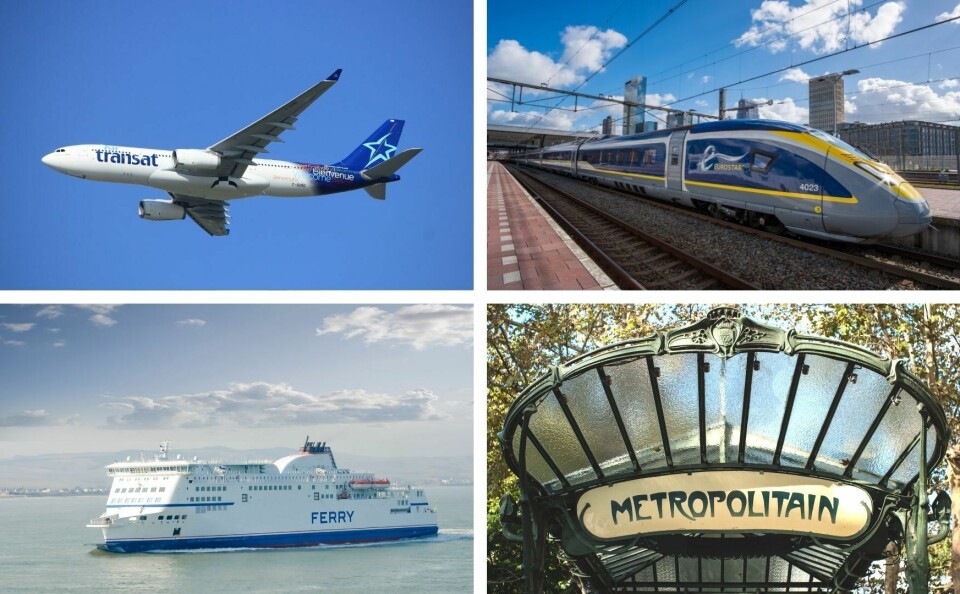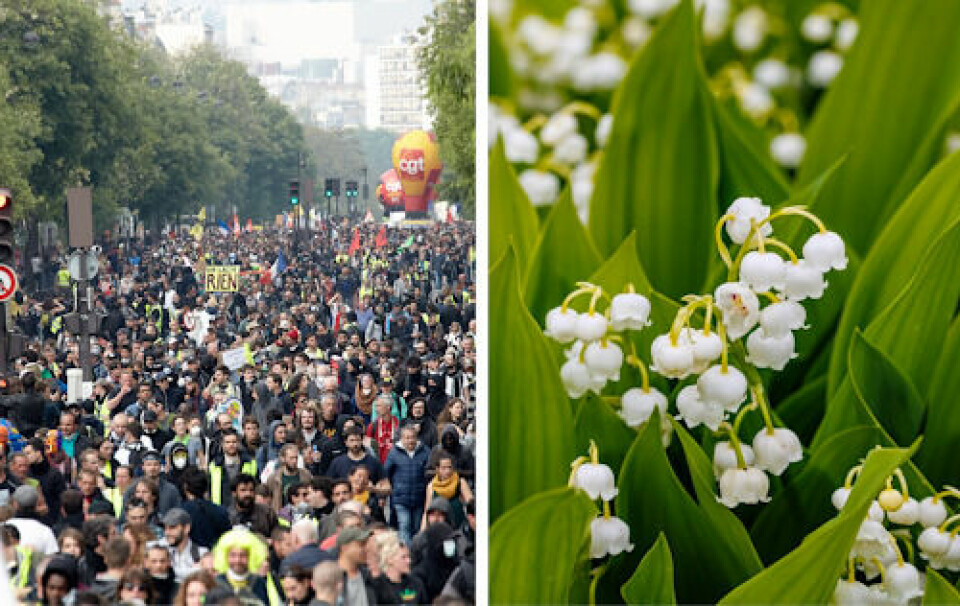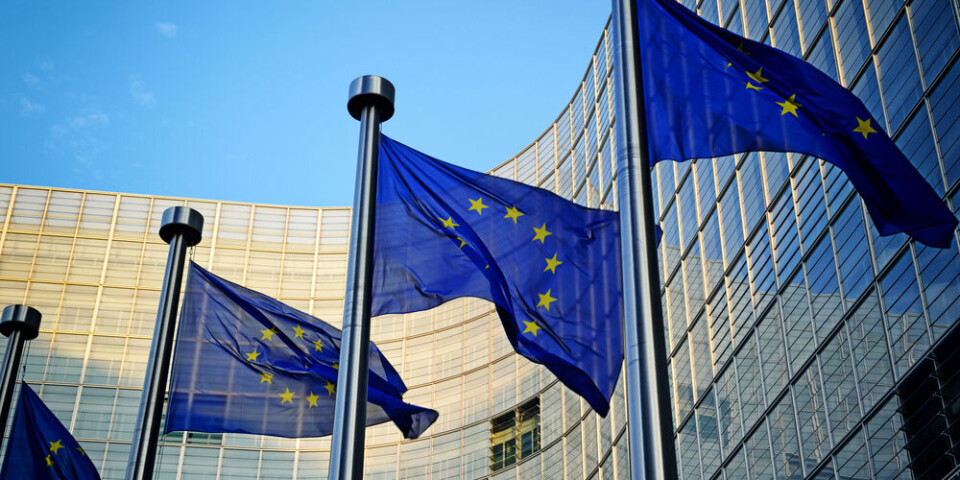-
Key Alpine pass to reopen this summer after €6m repairs
The col d'Allos in Alpes-de-Haute-Provence has been closed since 2023 due to severe weather
-
Why 500,000 people in France will soon be getting a call from health officials
A new campaign will target certain individuals with particular health conditions
-
Receive a book and a rose: France prepares to celebrate its independent bookshops
The 27th edition of the Fête de la librairie indépendante will take place tomorrow (April 26)
New UK-France flights; Eurostar merger may see London-Bordeaux line
Our weekly round-up of French travel news involving trips to, around or from France

We look at the news affecting travel to, from and around France this week.
1. EasyJet launches two new London-France routes
Low-cost airline EasyJet has launched two new routes from London-Gatwick to Rennes and Limoges.
There will be two to five weekly flights to Rennes until October 28, and EasyJet will be without competition on this route.
From this week until October 27, there will be three weekly services between Gatwick and Limoges. Ryanair also runs this route from Stansted.
2.Eurostar plans destination list expansion with French, Belgian and German routes - and a London-Bordeaux service
Eurostar has revealed plans to expand its offering as plans for a merger with high-speed train operator Thalys take shape.
Eurostar currently runs high-speed services from London to Paris, Brussels, Lille, Amsterdam and Rotterdam.
This merger will create a new company, Eurostar Group, which will offer a direct route between London and Cologne by linking Eurostar’s Channel Tunnel line to Thalys’ French, Belgian, Dutch and German lines.
The London to Cologne journey will take around five and a half hours, and passengers will also be able to reach Düsseldorf, Essen, Aachen and Dortmund on other Thalys services.
As well as the German routes, the merger is expected to include a London-Bordeaux service, as well as trains to Belgian destinations such as Antwerp and Liège.
The companies have not yet shared details on when passengers might expect to see these routes open, and a Eurostar spokesperson told The Connexion that "it is too early to share anything on [this subject] at this stage."
"The first thing we are working on for customers is a joint loyalty programme," she added.
CEO of Belgian rail company SNCB and Thalys board member Sophie Dutordoir said: “This merger project is based on the firm belief that trains are the most sustainable, fast, efficient and safest way to travel in Europe—now more than ever,” .
Eurostar Group has said that it hopes to be transporting 30 million passengers per year by 2032, compared to 18 million in 2019.
3.Regular France-Morocco ferry service resumes
Passenger ferry services between the French port of Sète (Hérault) and Tangier in Morocco have resumed this week following the end of Covid restrictions.
Morocco opened its maritime borders on April 18, allowing visitors from France to arrive in the country by ferry.
“With Covid, we have been waiting for this trip for three years. We are so happy,” one passenger told France 3.
The trip takes about 40 hours, with several crossings each week.
In 2019, 250,000 people took the ferry from Sète to Morocco, 135,000 on ferries and 115,000 on cruises. This is compared to just 3,000 in 2009.
4.Air Transat resumes flights from Bordeaux and Bâle-Mulhouse to Montreal
Passengers travelling from Bordeaux and Bâle-Mulhouse can now once again reach Montreal with Air Transat.
There will be four weekly flights running from Bordeaux every week until the end of October, and one from Bâle-Mulhouse.
Air Transat is without competition on both of these routes.
Bordeaux Airport’s Simon Dreschel said: “Canada represents a €330million market in Nouvelle-Aquitaine. Some 8% of foreign tourists in Bordeaux are Canadian.
“Our partnership with Air Transat has for many years reflected our desire to develop this transatlantic market in both directions.”
Passengers travelling to Montreal will be able to continue on to other Canadian destinations with domestic Air Transat flights to Vancouver and Calgary, which have also recently been relaunched.
Welcome back @airtransat ! ✈️ Let’s go to Montreal from EuroAirport! 🇨🇦
— EuroAirport (@euroairportcom) May 5, 2022
Canada here I come! https://t.co/SqFvcs18yu#airtransat #euroairport #Montreal #welcomeback #A321NeoLR #westjet pic.twitter.com/mP9rqQYkm5
5.SNCF Connect update arrives, bringing new functionalities
The SNCF Connect booking and itinerary app has been updated to respond to user complaints regarding its tools and format.
Read more:We try out SNCF's new app for French train tickets and traffic updates
After some SNCF customers said that the black and grey colour scheme of the app was “too dark” and made it difficult to see, the company has introduced a ‘bright mode’ option. It did argue, however, that the dark presentation aided “visual comfort” and helped to “save energy”.
If you wish to change the app to its bright mode, you will need to update it, then visit the ‘Compte’ (Account) tab, choose ‘paramètres’ (settings) and then ‘affichage’ (display).
SNCF has also introduced new functionalities, enabling passengers to buy tickets with chèques-vacances holiday vouchers.
There is also now a calendar tool showing how prices vary over a month, as well as an option allowing customers to filter search results to show the lowest prices only, for example.
In addition, it is now possible to set alerts relating to specific destinations.
Since SNCF Connect was launched in January, 36 million tickets have been sold through the app, and it has been downloaded by more than 1.6 million people.
6.A setback for the Paris métro Ligne 1 extension project
A committee charged with examining plans to extend Paris’ métro Ligne 1 between Vincennes and Fontenay-sous-Bois has returned an unfavourable judgement on the project.
The commission stated that even though the aim “was in the general interests [of the public], the advantage/disadvantage balance [...] leans incontestably towards the disadvantages which the project would generate.”
The extension would involve building a 5km tunnel and three new stations at Les Rigollots, Grands Pêchers and Val-de-Fontenay, as well as a maintenance centre in Neuilly-Plaisance.
It would also cost €1.7billion, and work on the project has already begun to fall behind schedule, with completion not envisaged before 2035. The commission also observed that the works’ proximity to the water table would create a flood risk.
“We are going to look at the conclusions of the committee and respond so that the project can go ahead,” a spokesperson for Ile-de-France Mobilités told AFP.
The regional transport operator added that “this project is vital, as it will allow us to open up the east of Vincennes, the south of Montreuil and Fontenay-sous-Bois, which [currently] lack public transport.”
It is estimated that an extra 95,000 people would travel on the Ligne 1 each day if the extension went ahead as planned.
The Communist group of the regional council said: “This is a real shock for local councillors and for the thousands of people who support the extension and are expecting solutions to their difficulties with getting around in the midst of this climate emergency.”
The commission pointed out that the towns which would benefit from the Ligne 1 extension are already connected to the centre of Paris by the RER A and E, and will be linked up by ongoing work on the Ligne 15 and the T1 tram line.
7.Trenitalia Paris-Lyon-Milan services 89% full since December launch
Italian train operator Trenitalia has reported that, since it launched its Paris-Lyon-Milan service last December, its trains have been 89% full.
“The results have been interesting: we have had 210,000 travellers with trains 89% full, which is beyond our expectations, especially between Milan and Paris,” Roberto Rinaudo, the director of the company in France, told BFM Business.
Trenitalia will be starting two additional return Paris-Lyon journeys in June, and Mr Rinaudo added: “If there is the opportunity to launch other projects, we will consider it, but we are careful.
“Within the regional market, we are interested in participating in certain projects, in areas where we can create synergies with our existing offer.”
8.Air France halves CO2 emissions on two flights
Air France has halved its CO2 emissions on flights from Paris to Montreal and Lisbon as part of its efforts to reduce the total emissions from 2019 by 30% by 2030.
The Montreal flight in question was 16% fuelled by sustainable aviation fuel (SAF), with the proportion rising to 30% for the Lisbon service.
On normal flights, only 1% of the fuel which goes to power flights departing from France is sustainable.
Sustainable aviation fuel is produced through feedstocks such as cooking oil and non-palm waste oils. It can reduce CO2 emissions by up to 80% compared to conventional fuel.
Air France’s experimentation with SAF forms part of the Skyteam Sustainable Flight Challenge, which has been inviting airlines to trial more eco-friendly flight practices between May 1 and May 14.
During this time, Air France is also offering passengers meals which have been made more sustainably, using local, in season ingredients. Waste has been reduced by offering customers the choice of several different options, and by limiting the amount of plastic packaging used on board.
Related articles
P&O’s Dover-Calais route resumes for first time since mass sackings
More flights, new routes: France - US air travel gears up for summer
149 electric buses suspended in Paris area after two fires in a month
























